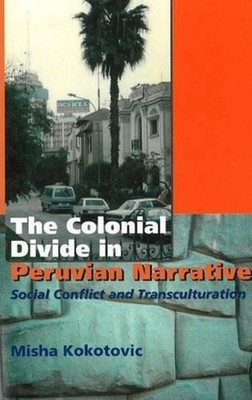
- We will send in 10–14 business days.
- Author: Misha Kokotovic
- Publisher: Sussex Academic Press
- ISBN-10: 1845190297
- ISBN-13: 9781845190293
- Format: 15.2 x 22.9 x 1.8 cm, kieti viršeliai
- Language: English
- SAVE -10% with code: EXTRA
Reviews
Description
Peru is a nation built on the still extant colonial divide between indigenous peoples and the descendants of their Spanish conquerors, a divide that finds expression in the short stories, novels, and essays by renowned Peruvian writers such as Jose Maria Arguedas and Mario Vargas Llosa. The Colonial Divide in Peruvian Narrative explores debates over Peru's modernisation and cultural identity in post-1940 literature, exploring how Arguedas, Vargas Llosa, and others confronted challenges of language, style, and narrative form in their attempt to write across their nation's cultural divisions. elite and its indigenous majority, how historical change stimulated the emergence of new narrative techniques, and how these in turn made possible an understanding of the historical contexts in which they arose. Though Peru is its principal focus, the text engages with current studies of modernity at the postcolonial margins of the Western world by contributing to an understanding of the class and ethnic conflicts generated by rapid modernisation in culturally heterogeneous nations. This book will add to the growing body of critical literature on the ways in which modernity in formerly colonised nations such as Peru is inflected by the enduring legacies of colonialism."
EXTRA 10 % discount with code: EXTRA
The promotion ends in 22d.06:22:21
The discount code is valid when purchasing from 10 €. Discounts do not stack.
- Author: Misha Kokotovic
- Publisher: Sussex Academic Press
- ISBN-10: 1845190297
- ISBN-13: 9781845190293
- Format: 15.2 x 22.9 x 1.8 cm, kieti viršeliai
- Language: English English
Peru is a nation built on the still extant colonial divide between indigenous peoples and the descendants of their Spanish conquerors, a divide that finds expression in the short stories, novels, and essays by renowned Peruvian writers such as Jose Maria Arguedas and Mario Vargas Llosa. The Colonial Divide in Peruvian Narrative explores debates over Peru's modernisation and cultural identity in post-1940 literature, exploring how Arguedas, Vargas Llosa, and others confronted challenges of language, style, and narrative form in their attempt to write across their nation's cultural divisions. elite and its indigenous majority, how historical change stimulated the emergence of new narrative techniques, and how these in turn made possible an understanding of the historical contexts in which they arose. Though Peru is its principal focus, the text engages with current studies of modernity at the postcolonial margins of the Western world by contributing to an understanding of the class and ethnic conflicts generated by rapid modernisation in culturally heterogeneous nations. This book will add to the growing body of critical literature on the ways in which modernity in formerly colonised nations such as Peru is inflected by the enduring legacies of colonialism."


Reviews